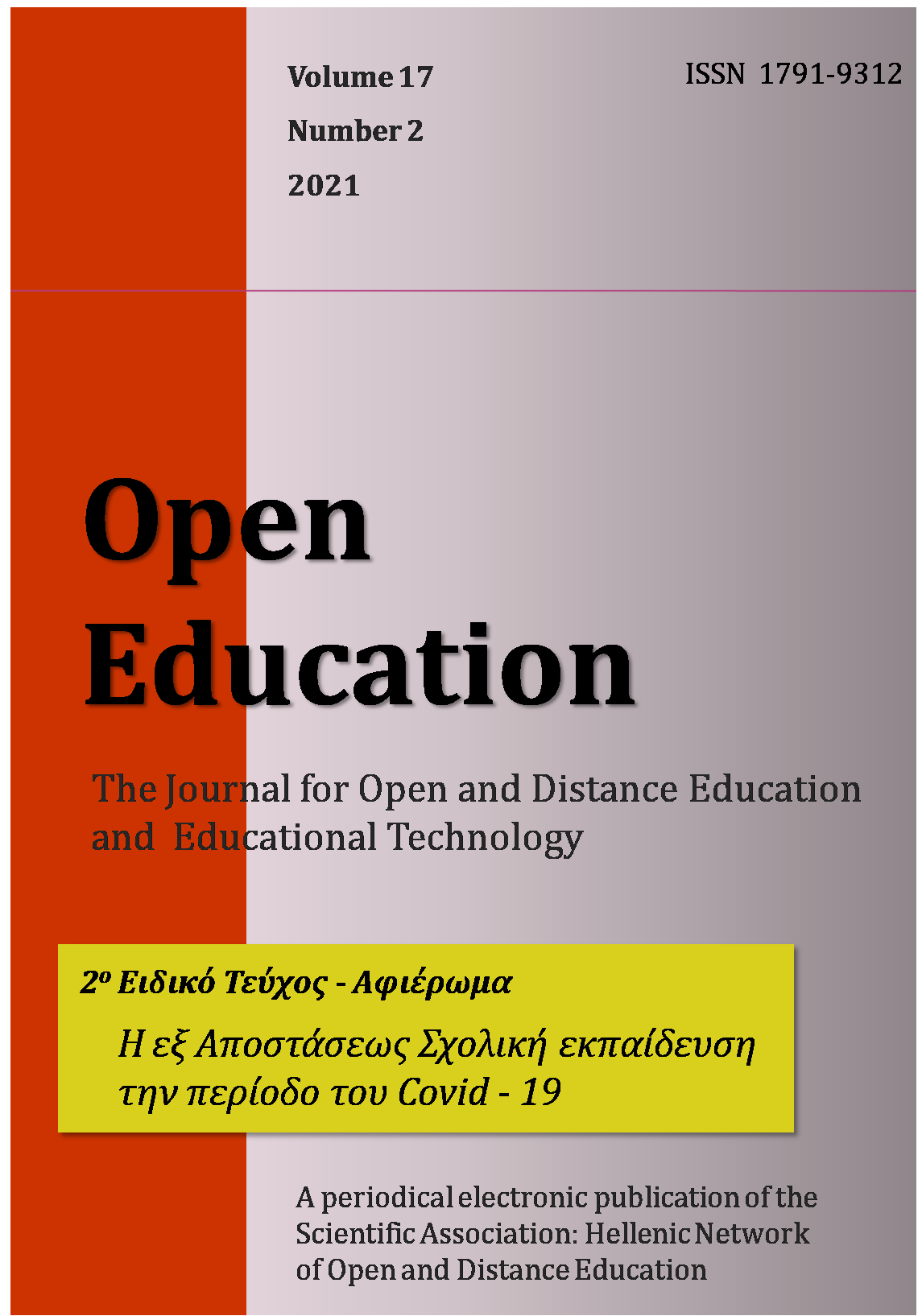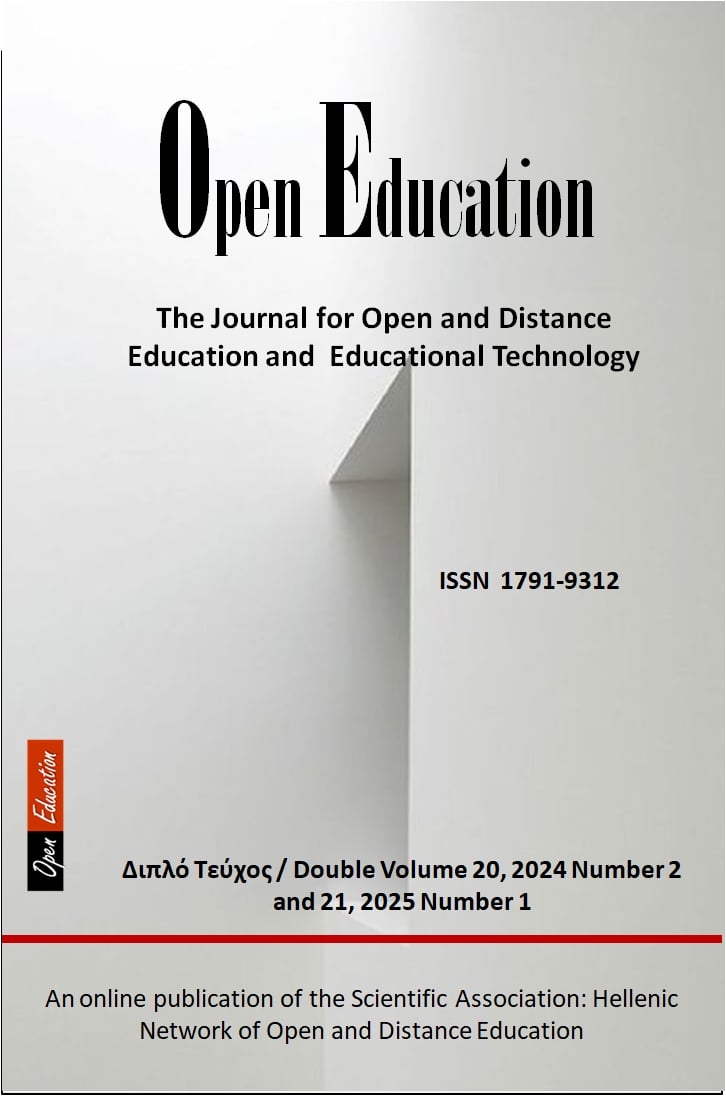Η εξ αποστάσεως διδασκαλία της Μουσικής στην εποχή «Μένουμε Σπίτι»: Μια πρώτη προσέγγιση στο Πειραματικό Σχολείο του Πανεπιστημίου Θεσσαλονίκης Distance learning of Music, in the era of "Staying Home": A first approach at the Experimental School of the University of Thessaloniki
Abstract
Περίληψη
Η εργασία στοχεύει στη διάχυση της εμπειρίας «μεταμόρφωσης» προϋπαρχόντων διδακτικών σεναρίων, μέσω της τεχνολογίας, για την εξ αποστάσεως σύγχρονη & ασύγχρονη διδασκαλία του μαθήματος της μουσικής στην Δευτεροβάθμια Εκπαίδευση, με ενσωμάτωση τεχνολογικών εργαλείων, εφαρμογών και λογισμικών που προτείνονται από την Επιμόρφωση Β2 Επιπέδου Τ.Π.Ε. για τις Τέχνες. Για κάθε «μεταμορφωμένο» διδακτικό σενάριο μουσικής παρουσιάζονται δραστηριότητες που εφαρμόστηκαν στο Πειραματικό Σχολείο του Πανεπιστημίου Θεσσαλονίκης – Γυμνάσιο και Λύκειο - κατά την εποχή «Μένουμε Σπίτι» (Μάρτιος-Μάϊος 2020). Οι δραστηριότητες αυτές υλοποιήθηκαν με σύγχρονη εξ αποστάσεως διδασκαλία μέσω της πλατφόρμας Webex σε συνδυασμό με ασύγχρονη εξ αποστάσεως διδασκαλία μέσω της e-class του σχολείου στην πλατφόρμα Moodle. Αρχικά, επιχειρείται η αποσαφήνιση και ανάλυση των κριτηρίων αξιολόγησης των διαδικτυακών πηγών για το μάθημα της μουσικής και στη συνέχεια παρουσιάζονται τα τεχνολογικά εργαλεία, οι εφαρμογές και τα λογισμικά που αξιοποιήθηκαν στο πλαίσιο της εξ αποστάσεως διδασκαλίας. Τέλος παρουσιάζεται η μεθοδολογία, κατατίθεται η εμπειρία της υλοποίησης και συνοψίζονται τα συμπεράσματα και οι προτάσεις της εργασίας.
Summary
The work aims in diffusing the experience of "transforming" pre-existing teaching scenarios through technology, for the teaching of music in Secondary Education, by integrating technological tools, applications and software, proposed by the B2 Level ICT Training for the Arts, in distance - synchronous & asynchronous - teaching. For each "transformed" music teaching scenario, activities are presented that were implemented in the Experimental School of the University of Thessaloniki - Junior High school and Senior High School - during the period "We Stay Home" (March-May 2020). These activities were implemented with synchronous distance learning using the Webex platform in combination with asynchronous distance learning on the school’s e-class Moodle platform.
The tele-education solution, during the "We Stay Home" era, led to the organization of teaching music lessons, in the Junior High school and Senior High School, in a different and unprecedented way. An ideal solution/choice of strategy was the utilization-reversal-transformation of already implemented conventional teaching scenarios, integrated with software, web applications and tools intended for educational use. This integration creates many new possibilities, offers a pleasant and user-friendly interface, provokes students' interest and enhances collaborative learning.
The Ministry of Education and Religions of Greece, responding immediately to the developments, activated digital tools that allow distance learning. Webex Cisco application, was the official, free, platform provided by the Ministry of Education for modern, in real-time, distance learning. The use of the platform initiated at the Experimental School of the University of Thessaloniki on March 16, 2020 for the 3rd grade of the Senior High School, on March 23, 2020 for the 1st and 2nd grade of the Senior High School and on March 30, 2020 for the 1st, 2nd and 3rd grade of the Junior High School. At the Experimental School of the University of Thessaloniki, asynchronous distance education took place through the school's e-class (Moodle platform).
First, clarification and analysis of the evaluation criteria of the online sources for the course of music is attempted, followed by the presentation of the technological tools, applications and software used in the context of distance learning. The proposed activities were implemented with synchronous distance learning through the Webex platform, in combination with asynchronous distance learning through the school's e-class on the Moodle platform. The observation of the teaching process, the deliverables of the students and their answers to the anonymous electronic questionnaires, indicated that all the students showed great interest and enthusiasm, took an active part, took initiatives and interacted. No problems were observed in the operation of the groups, nor were there any particular difficulties in the various stages of implementation of the teaching proposals. Familiarity with teamwork, even when frustrated, was extremely beneficial for the children as they were sometimes "forced" to take initiatives and sometimes to back off. The students found the activities very interesting, they developed their skills in music, they developed important digital literacy skills and they gained knowledge through a fruitful interactive process. Because of its general distance-based delivery model and widespread incorporation of technology applications, distance education was uniquely positioned to incorporate the enriched, connected, networked learning that connectivism envisions.
Finally, the methodology is described, the experience of the implementation of the work plans is presented and the conclusions and suggestions of the work are summarized.
Article Details
- Come citare
-
- Fascicolo
- V. 17 N. 2 (2021)
- Sezione
- Μέρος δεύτερο / Section 2




